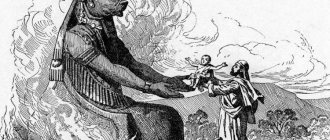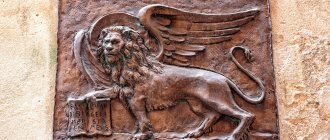Orthodox Christians who read the Gospel every day find more and more new meanings in this Book. As you know, there are four canonical Gospels included in the New Testament - from Matthew, Mark, Luke and John. Each of these Books has its own characteristics.
In order to correctly understand the meaning of what is written, you can use special interpretations or explanations (only from verified authoritative sources), since it may not be clear to a person not versed in the topic what is being said. Today we will get acquainted with the Gospel of Mark, we will analyze its features and differences.
General characteristics of the entire Gospel of Mark
Judging by the structure of the text and the narrative itself, we can say that this Gospel is semantically divided into two parts. The first half begins with the sermon of John the Baptist, who was sent by the Lord to prepare the people of Israel for the coming of Christ.
The following is the story of the baptism of the Savior Himself, His first sermons and miracles. And in the Gospel of Mark, the first miracle performed by the Lord is the casting out of an evil spirit. One of the most cruel manifestations of evil in a person’s life is obvious obsession. It is scary not only because a person loses power over himself, but also in its external expression.
According to theologians, Mark was a translator of the Apostle Peter and described the events of his Gospel about Jesus Christ from the words of Peter, without being a witness. They also admit that the Gospel of Mark is the earliest account of the life and work of Jesus Christ; Luke and Matthew used Mark's messages when writing their Gospels. It is also generally accepted that Mark did not write all this for the Jews: some details of the explanation of the customs of the Jews show that this narrative was intended for those unfamiliar with the customs of Judaism. So, the Gospel of Mark, a brief summary of the facts from the life, work, death and resurrection of Jesus Christ, conveyed by Mark from the words of the Apostle Peter.1:1,2 The beginning of the gospel of Jesus Christ, the Son of God,
2 as it is written in the prophets: Behold, I send My angel before You, who will prepare Your way before You.
For Mark, the beginning of the appearance of Christ to the people is the period of the activity of John the Baptist, warning Judea of the appearance of the Messiah. As we see, without studying the Old Testament it is impossible to understand what Mark means when he quotes the prophet Malachi.
Note also that the words of Mark are different from the words of Malachi, in blue: Behold, I send my angel, and he will prepare the way before me, and suddenly the Lord, whom you seek, and the angel of the covenant, whom you desire, will come to his temple; Behold, He comes, says the Lord of hosts.
Mark explained what Malachi warned God's people about: he said that Jehovah God would visit His people through His messenger, the Messiah, whom the Jews were waiting for. However, before the appearance of the Messiah in Judea, a messenger must appear to prepare God's people to receive the first coming of God's messenger. This messenger turned out to be John the Baptist.
The same thing will happen before the second coming of Christ: someone will shout to the sleeping “virgins” awaiting the second coming of the “groom”: “The groom is coming!” This means that before the second coming of Christ there had to be someone who would PREPARE THE WAY FOR CHRIST - who would warn God’s people that he was close, at the door.
1:3 The voice of one crying in the wilderness: Prepare the way of the Lord, make His paths straight.
This messenger, warning Jehovah's people about the first coming of Christ, will become a voice crying in the wilderness, about which the prophet Isaiah 40:3 warned: in the literal sense, John the Baptist actually came from the desert of Judea, and in the spiritual sense, he called out to to the people, but his voice seemed to disappear into emptiness: no matter how hard John tried to prepare the way in the hearts of Israel for the acceptance of Christ, his words were rejected and Christ was killed.
However, the words of the prophets clearly show that the coming of Jesus Christ from God to earth was planned by God since ancient times; those who knew the circumstances of the conclusion of the Old Testament in the desert to Mount Sinai should, in theory, have had spiritual associations about the voice of the voice in the desert proclaims a covenant with God, and the Messiah is directly related to this covenant with God.
1:4 John appeared, baptizing in the wilderness and preaching a baptism of repentance for the forgiveness of sins.
So, John the Baptist cries out in the desert about straightening the paths for the Lord Jesus Christ coming into the world. How could the path that the Lord should have followed be straightened? John asked to prepare your hearts to let Christ in, so that it would not be difficult for him to penetrate into these hearts. That is why the Jews had to repent of their sins and wash themselves with water for cleansing: there is simply no other way to straighten the Lord’s path to us and in us. And John helped those waiting for the Messiah to understand THIS.
1:5 And the whole country of Judea and the people of Jerusalem came out to him, and they were all baptized by him in the Jordan River, confessing their sins.
The reaction to John’s voice among God’s people was, for the most part, adequate; entire families came out to him (the expression “
the whole country”
is just a hyperbole; it is known that not all Jews decided to be baptized by John). Baptism by immersion in water was known to the Jews: this is how the pagans were converted to Judaism, which meant that the pagans were now ready to accept the God of Israel and lead the way of life that the Jews lived.
However, water baptism for the Jews themselves was an unusual phenomenon: if they were already dedicated to the God of the covenant from birth, then what does repentance have to do with it - for a people who were considered righteous? John showed the Jews that, in fact, the covenant in which they had entered into with God until now was not capable of forgiving their sins; they were still sinners before God if they had to wash themselves of their sins with the waters of the Jordan before accepting the coming Lord.
The process of repentance, culminating in a symbolic washing, did not make them righteous in the true sense, but made them fit to soften their hearts, hardened by sins, and to recognize in Christ Jesus, the messenger of the God of Israel. For true forgiveness of sins, Jesus Christ came, who had to atone for the sins of the whole world and give a chance to become righteous before the Lord to everyone who wishes to become so with the help of Christ. 1:6 And John wore a robe of camel's hair, and a leather belt about his waist, and ate locusts and wild honey.
The ascetic lifestyle of John the Baptist should, in theory, awaken in Israel the guess that he was not an ordinary mortal man, but endowed with some kind of mission, for all the prophets of Israel lived without indulging in the universal path of the Jews, filled with earthly interests .
1:7 And he preached, saying: He who is mightier than I is coming after me, whose sandal strap I am not worthy to stoop down to untie;
John was given from above the knowledge of who he was to present in his sermon.
John was not talking about physical strength here, although he was half a year older than Jesus Christ. He reported on the spiritual power of Jesus Christ following him and, of course, about his superhuman strength received from above to fulfill the powers determined by God on earth. 1:8 I baptized you with water, but He will baptize you with the Holy Spirit.
John the Baptist explained that water baptism through him in the era of the O.T.
(John) - symbolizes recognition of sinfulness and repentance in order to be ready to appear before the coming Christ of God, who opens the era of action of the New Testament. The Baptism of John did not testify that someone accepts
Christ as a messenger of God, but testified only to the readiness and “suitability” to meet him (those who do not repent of their hearts cannot see the messenger of God in Christ)
For anyone who wants to become a Christian today, in the era of N.T. — one should receive water baptism in the name of Jesus Christ, that is, in order to follow in the footsteps of Christ in everything in the era of the New Testament (see Acts 2:39-39).
After receiving water baptism in the name of Jesus, you can also expect the baptism of Jesus: the baptism of the holy spirit (the designation of the chosen one of God through the anointing of the holy spirit from above). For example, the incident in Ephesus showed that some of Christ's disciples received John's water baptism, but had no idea that in the era of N.T. indeed water baptism in the name of Christ and baptism in the holy spirit. That is, first, those who want to become a disciple of Christ accept water baptism in the name of Jesus and become unanointed Christians. And then, if God wills, they can receive the holy spirit through the baptism of Christ. The Apostle Paul showed the Christians from Ephesus what Christ's baptism means: when he laid his hands on these disciples, as if thereby introducing them to Christ, Christ poured out the holy spirit on them (Acts 19:1-6) Jesus, seeing their repentant hearts , he himself determines which of the repentant sinners he wants to use on earth as his faithful assistant, and designates him with the holy spirit (for the meaning of baptism with the holy spirit, see John 1:33). Water baptism in the name of Jesus is only an external manifestation of internal repentance and readiness to accept the redemption of Christ, so that the whole society could henceforth observe the life of the one who declared himself to be a person redeemed by Christ. For example, Cornelius, who repented in his heart, was baptized by Jesus with the holy spirit without water procedures. However, after this, Cornelius also did not escape baptism with water in the name of Christ: being noticed by Christ from the inside, he also showed his repentance to those outside through water baptism (Acts 10:47,48) If we talk about the baptism of John for Jesus Christ, then he is not in what there was to repent of, what the baptism of Jesus means - we will consider below, in text 10.
1:9,10 And it came to pass in those days that Jesus came from Nazareth of Galilee and was baptized by John in the Jordan. 10 And when he came out of the water, [John] immediately saw the heavens opening and the Spirit like a dove descending on Him.
If we talk about Jesus, he was baptized by John not for the remission of sins: he had nothing to forsake, he was sinless (1 Pet. 2:22) For Christ, to be baptized by John meant, firstly, to fulfill the will of the Father in order to John could see in him the chosen one of God through the external manifestations of the descent of the holy spirit on Christ and reveal Christ to the world (John 1:33). And secondly, he will show the path of becoming a Christian to the whole world, so that they will follow in his footsteps: i.e. - accepted water baptism following the example of Christ for rebirth to a new life in serving Jehovah, and after water baptism - followed in the footsteps of Christ (led the lifestyle of a Christian, 1 Pet. 2:21). After Jesus died, water baptism began to be called baptism in the name of Jesus Christ (baptism of initiation into Christianity).
Without water baptism in the name of Christ, testifying to the declaration to do the will of God, baptism with the holy spirit may not take place (Acts 2:38) (Cornelius is an exception to the general rule: the Jews forbade pagans to receive water baptism, considering them wicked and unworthy of Christian way. To make it easier for the Jews to accept the pagans as disciples of Christ, God performed the miracle of the descent of the holy spirit on the pagans: from now on there was no doubt that since God accepted the pagans, the Jews should also accept them as disciples of Christ, Acts 10:47 ).
But water baptism is only the beginning of the Christian path: it does not oblige Jesus Christ to immediately baptize the newcomer - also with the Holy Spirit. Baptism with the holy spirit depends on the decision of Jesus, when he deems it necessary - then a Christian can be baptized with the holy spirit (remember the example of the Ephesians: until their time came - the holy spirit was not given to them after water baptism, Acts 19: 2-6)
1:11 And a voice came from heaven: You are my beloved Son, in whom I am well pleased.
Confirmation of the election of Jesus Christ by a voice from heaven helped strengthen John in the correct identification of God's son.
1:12,13 Immediately after this the Spirit led Him into the wilderness.
13 And He was there in the wilderness forty days, tempted by Satan, and was with the beasts; and Angels served Him. About the temptation of the devil Jesus Christ in the desert - see the detailed analysis of Matt. 4:1-11 It is believed that Jesus being in the wilderness symbolizes the Christian in a world under Satan's dominion.
1:14 After John was betrayed, Jesus came to Galilee, preaching the gospel of the kingdom of God.
Mark tells of the ministry in Galilee after John's arrest.
What did Jesus preach about?
About Me? No, he brought the good news about the opportunity to get into the Kingdom of God and what this Kingdom of God means. 1:15 and saying that the time is fulfilled, and the kingdom of God is at hand: Repent and believe in the gospel.
Jesus explained that the time allotted by God for Israel in the Old Testament had expired, and the time had come to make changes in God's relationship with people for the salvation of all who could be saved. The Kingdom of God has come closer in the sense that with the coming of Jesus Christ, every person has a chance to get into this Kingdom of God, it has become available to everyone who makes a conscious effort to enter it (Luke 16:16). Conscious efforts include, first of all, awareness of sinfulness, repentance and faith in the good news that Jesus Christ brought to earth.
1:16-20 And as he passed near the Sea of Galilee, he saw Simon and Andrew his brother casting nets into the sea, for they were fishermen.
17 And Jesus said to them, Follow me, and I will make you fishers of men. 18 And they immediately left their nets and followed Him. 19 And having gone on from there a little, He saw James Zebedee and John his brother also in a boat mending nets; 20 and immediately called them. And they, leaving their father Zebedee in the boat with the workers, followed Him. Calling disciples.
Let us note that the future “fishers of men” students are called upon not from the layers of the religious intelligentsia, but from the common people. For more details, see the analysis of Mtf. 4:18-20 1:21,22 And they come to Capernaum;
and soon on the Sabbath He entered the synagogue and taught. 22 And they marveled at His teaching, for He taught them as one having authority, and not as the scribes.
How did Jesus, in teaching others, differ from the official teachers among God’s people—the scribes and Pharisees? How did the scribes and Pharisees teach? They were not God's anointed ones, marked through the holy spirit. This class of leaders of God's people came to power almost 200 years before the coming of Christ. They did not have the gift of understanding the word of God from above, so they had to scrupulously search the Scriptures, analyze the meaning of words and expressions in the Law of Moses, try through comparative analysis, trial and error - to come to some logical conclusion, not being one hundred percent sure of that , to which they came by the method of deduction, but without rejecting their versions in the interpretation of Scripture.
Jesus was led by the holy spirit, having an understanding of the meaning of God's word - from above, and always knew exactly what revealed the meaning of God's plan - correctly (regardless of what meanings certain expressions in the Law could have).
If a gardener, for example, KNOWS EXACTLY HOW to grow cucumbers from his own practice, then he will be able to teach this to every gardener accurately and without hesitation, AS THE ONE WITH POWER, and will be able to answer any question related to growing cucumbers.
And if he is only theoretically and philosophically familiar with the methods of growing cucumbers, he will not be able to teach with the confidence of an expert who has the power to convey personal experience. The theorist will either not answer practical questions or will mislead the questioners with his answers. That's the whole difference.
1:23,24 23 In their synagogue there was a man [possessed] by an unclean spirit, and he cried out: 24 Leave it! What have you to do with us, Jesus of Nazareth? You have come to destroy us! I know You, who You are, the Holy One of God.
Unclean spirits know about their future destruction and the executor of the judgment over them - the holy Christ of God. The strange thing about all this knowledge is that they, KNOWING that they are doing wrong and will die for it, nevertheless, do not stop doing evil. What is this? Stubborn refusal to live according to God's laws? Love of evil? What prevents them from repenting and stopping doing evil?
1:25 But Jesus rebuked him, saying: Be silent and come out of him.
Jesus forbade the unclean spirit to spread his acquaintance with Jesus as God's saint: the Jews themselves should have guessed, observing his unusual deeds, that he was a messenger of God.
1:26 Then the unclean spirit, shaking him and crying out with a loud voice, came out of him.
However, no matter how unclean spirits persist in their desire to harm people, their influence is limited: when the time comes, they will all be destroyed by Jesus Christ. In the meantime, Jesus showed what power he has from his heavenly Father over all evil spirits walking on earth.
1:27 And everyone was horrified, so they asked each other: what is this? What is this new teaching that He commands even the unclean spirits with authority, and they obey Him?
The Jews accepted the casting out of demons as part of that new teaching with the help of which it was possible to cast out demons. As we see, the Jews knew very well about the existence of unclean spirits, but it was surprising to them that there were higher powers above them, and these powers were demonstrated by Jesus Christ
1:28 And soon rumors about Him spread throughout the entire region in Galilee.
Rumors about such miracles spread in human society with lightning speed; it is not surprising that the popularity of Jesus Christ as a new teacher and magician increased sharply after the miracles demonstrated.
1:29-31 Soon leaving the synagogue, they came to the house of Simon and Andrew, with James and John. 30 Simon's mother-in-law lay in a fever; and immediately they tell Him about her. 31 He came and lifted her up, taking her by the hand; and the fever immediately left her, and she began to serve them.
The healed mother-in-law of Peter did not begin her usual household duties, she began to serve Jesus Christ. Her healing is just another miracle of healing a patient; there were many of them in the future:
1:32-35 When evening came, when the sun had set, they brought to Him all the sick and demon-possessed.
33 And the whole city gathered at the door. 34 And He healed many who were afflicted with various diseases; He cast out many demons, and did not allow the demons to say that they knew that He was the Christ. 35 And in the morning, getting up very early, he went out and went into a deserted place, and there he prayed.
We noticed that Jesus healed many whom he managed to heal before morning, but not all. Why didn’t he stay there until he healed all the inhabitants of that area? Was it impossible for him to do this? Maybe. But the purpose of his coming to earth was not to become a folk healer. And in order to preach the word of God - first of all:
1:36-39 Simon and those who were with him followed him 37 and when they found him, they said to him, “Everyone is looking for you.” 38 He says to them: Let us go to the neighboring villages and cities, so that I may preach there too, for this is why I came. 39 And He preached in their synagogues throughout all Galilee and cast out demons.
Christ simply would not have had enough time to heal everyone who sought him and needed healing. There will be another time for this in the Millennial period of God's kingdom, which he preached about in places where God's people gathered to listen to the word of their God through teachers. In the meantime, the cases of healing served as confirmation of his preaching about the Kingdom of God - that healing in the Kingdom of God is really possible with the help of Jesus Christ.
1:40-42 A leper comes to Him and, begging Him and falling on his knees before Him, says to Him: if you want, you can cleanse me. 41 Jesus, having compassion on him, stretched out his hand and touched him and said to him: I want you to be clean. 42 After this word, the leprosy immediately left him, and he became clean.
(see also Matt. 8:1-3) According to God’s law for Israel (according to the Mosaic Law), the leper, instead of approaching Christ, had to shout: “Unclean, unclean!” (Lev. 13:43-46). And Jesus, according to God’s law, should have walked away from the leper and at least complained to the Sanhedrin that lepers violated the letter of the law for them.
But no. Jesus, knowing that the spirit of God's law is aimed at the good of people, healed the patient of leprosy, saving him from suffering, and society from the risk of contracting leprosy.
Although it might seem from the outside to zealous adherents of the letter of the Mosaic Law that Jesus, like the leper, were transgressors of the law, this example shows that, firstly, the Israelites did not fully understand the meaning of the Mosaic Law. And secondly, that God loves people and therefore gave Christ the power to heal the sick in order to show this love in action.
In addition, the leper showed extraordinary meekness in his request: if you want, you can cleanse me.
He knew that Jesus heals people, but did not consider Christ obligated to heal him, and therefore asked Christ for help, if only Christ himself wanted to help him. Christ, of course, wanted to help those suffering, that’s why he came to earth, to show how much God and he want to save people from suffering.
We, often, are not taught to ask, but we know how to demand as if we are owed everything. If the leper had not asked meekly, but had demanded Christ’s attention to himself, and at the same time behaved defiantly, would Christ have listened to him? Would you like to clean it? We think it's unlikely.
1:43 And, looking at him sternly, he immediately sent him away
Jesus was merciful, but also strict when severity was necessary for the good of the cause.
The healed man had to understand that it was not worth dwelling on the topic of healing: 1:44 And he said to him: See that you don’t tell anyone anything, but go, show yourself to the priest and offer for your cleansing what Moses commanded, as a testimony to them.
Let us note that at the time of his first coming, Jesus, knowing about the complete unsuitability of the leaders of God’s people, nevertheless demanded the fulfillment of God’s law in force at that moment from the healed one. Why? Because Jesus himself recognized the form of worship of the Father that was organized at that time, without prematurely interfering with the course of events that contributed to the abolition of the Mosaic Law. The same situation can occur in modern assemblies of God’s people: the leaders in them may turn out to be unfaithful, but God’s requirements for Christians are relevant until the end of this age and they must be fulfilled regardless of how faithful the leaders of His people are to God.
1:45 And he, going out, began to proclaim and tell about what had happened, so that [Jesus] could no longer openly enter the city, but was outside, in desert places. And they came to Him from everywhere.
The healed man, alas, could not keep the secret of his healing; he not only did not listen to Christ in not spreading about his healing, but he also doubled and tripled his efforts to tell about it everywhere, because in his opinion Jesus deserved so that all of Judea would know about him. The case when our even noble desires may diverge from the desires of Christ: this person did a disservice to Christ. Now Jesus Christ had to find a way to avoid everyone who wanted to be healed and prevented him from moving through Israel to preach the gospel. The good of Jesus turned out to be evil for him because of the frivolity of the healed man.






